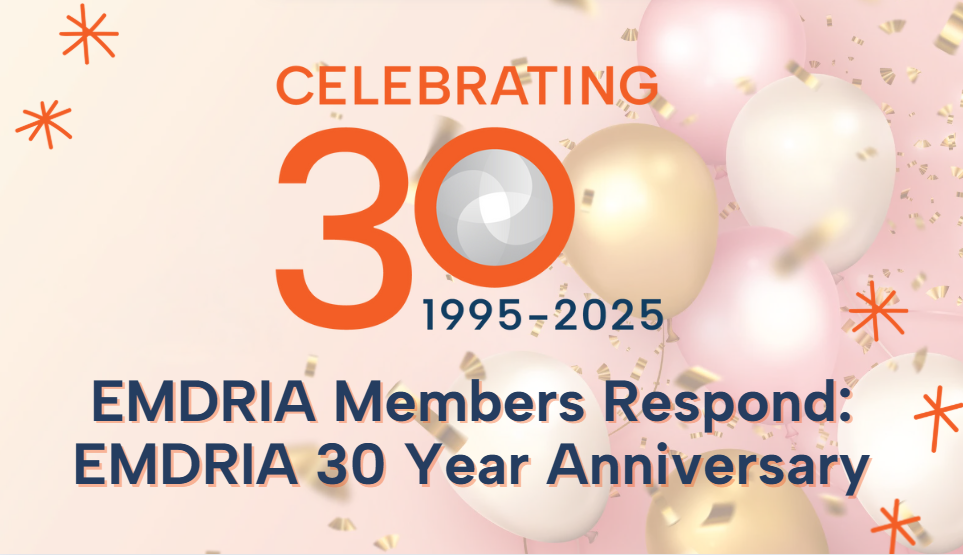EMDR therapists can celebrate BIPOC Mental Health Awareness Month (also known as the Bebe Moore Campbell National Minority Mealth Health Awareness Month) by integrating Community Cultural Wealth principles in their work with clients.
RESI stands for Racial Equity Support Initiative and refers to an EMDRIA Foundation program working to increase diversity in EMDR therapy. The RESI program is for EMDRIA members seeking EMDR Certification and Consultant status. The program aims to address systemic discrepancies by increasing access to leadership in the EMDR field (EMDR Certification and Consultant status). You can learn more about the program and how to apply or donate here.
We wanted to hear our RESI recipients for their take on using the lens of Community Cultural Wealth to identify internal and external resources in their clients. We asked for video or written responses to the following:
“Describe ways that you incorporate community cultural wealth into your work with clients who identify as BIPOC or Minoritized. For instance, what internal or external cultural resources might you install or strengthen to help these clients?”
***NOTE: Play the video and click on the ‘CC’ icon in the lower right-hand corner for closed captioning on the videos. *** Lilly Alaniz, LCSW *** Patricia Benitez, LCSW ***Amy Cornwall, LMFT *** Diane Kim, LMHC “As an EMDRIA Approved Consultant and EMDR therapist, I consider it a privilege to offer counseling services to a diverse clientele, including many Asian and other BIPOC individuals. One significant challenge I frequently observe among Asian clients is the difficulty in establishing a distinct individual identity separate from their family heritage. This challenge often arises from their cultural background in highly collectivistic societies or from intergenerational trauma linked to their parents’ experiences surviving wars or being children of war. The parents and grandparents of many Asian clients endured significant hardships, including wars and physical struggles. Consequently, although younger generations do not face the same scarcity mindset and lack of basic necessities, they have internalized a belief that they must continually strive for higher achievements to secure survival and avoid failure. This internal pressure can lead to maladaptive emotions such as an exaggerated sense of responsibility, guilt, shame, and a persistent need to perform at exceptionally high standards. As an EMDR therapist, I use this understanding to assist clients in developing initial awareness of their deeply ingrained beliefs and cultural experiences. Following this awareness, I focus on empowering clients through resourcing techniques to distinguish their selves from familial and learned expectations.” *** Natalie Milom, LCSW *** Karen Neri, LMFT, LPC “Some of the ways I incorporate community cultural wealth into my work with BIPOC clients is by identifying and leveraging their religious or spiritual beliefs (e.g., higher power or elements of Santería), and existing connections to their ancestral lineage as a source of external or internal resourcing. I may specifically ask BIPOC clients if they have religious or spiritual practices they would like to incorporate as part of EMDR. I may also ask them who they may find as a nurturing, supportive, or wise figure within their ancestral line and who can be with them in their process. I will then collaborate with BIPOC clients in terms of how they want to use these resources, such as by using them outside of session on their own, including how they may do so in ways that contribute to their healing or by helping them strengthen their ability to access or be soothe by these resources through the use of bilateral stimulation.” *** Pablo Orozco-Castro, LCSW “BIPOC practitioners like myself often find ourselves in situations where we live in a post-colonial era and attempting to hold onto cultural traditions passed on by generations, or in some instances re-introduced after generations of non-contact with these traditions. For me, I have found the power of song in my therapeutic practice. For the past six years, first as an Associate Clinical Social Worker and now as a Licensed Clinical Social Worker, I have been sharing traditional healing songs in my ancestors’ native language of Nahuatl with the community members that I serve. I recall one time I had been singing out in nature, trying to learn and grasp one song in my ancestors’ native tongue, only to be left in tears because of the feeling of disconnection that I have had for hundreds of years and questioning myself “Why was this song not passed down to me?!” It can be quite intimidating to be vulnerable when sharing traditional healing songs. Still, sometimes, it is well worth the risk when we support the communities we serve in connecting their ancestral roots and their healing process. *** Misty Ramos, ATR, LPCC-S “As a dually licensed art therapist and counselor, I often pair BLS with the client’s Indigenous and cultural art forms like visual art, textiles, music, etc., for strengthening. One way is by honoring their knowledge of cultural art forms to strengthen their sense of self and pride in cultural expression often devalued by the oppressors. This shifts their focus away from the oppressor’s lenses. I have them listen to music, view visual art, or wear/hold textiles and pair with slow BLS. I also pair slow BLS while they engage in Indigenous art-making, strengthening their confidence in their skills and abilities. I have them apply these to handle future issues creatively (can be done as a future template).” ***Dr. Richarne Fuqua, LPC (Dr. Shawn) *** Raychelle Wallace, LMHC “Incorporating community cultural wealth into EMDR therapy with high-achieving BIPOC clients begins with recognizing their educational and professional achievements. These accomplishments are often viewed as expectations, so this process allows clients to truly explore and acknowledge their greatness and capabilities within. We then create a future self-resource that honors the client and their achievements, using it as a foundation throughout the EMDR process and as a gentle reminder of who they truly are. This approach not only strengthens the client’s self-worth but also ensures their cultural identity is integral to their healing journey.” *** Maria Fernanda Wilber, LCSWBack to Focal Point Blog Homepage
Additional Resources
If you are a therapist interested in the EMDR training:- Learn more about EMDR at the EMDRIA Library
- Learn more about EMDR Training
- Search for an EMDR Training Provider
- Check out our EMDR Training FAQ
Date
July 19, 2024
Topics
Racial Trauma
Client Population
Racial/Cultural/Ethnic Groups
Practice & Methods
DEI/IDEA, Resourcing





